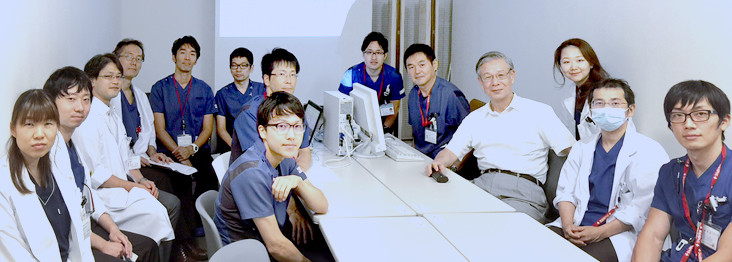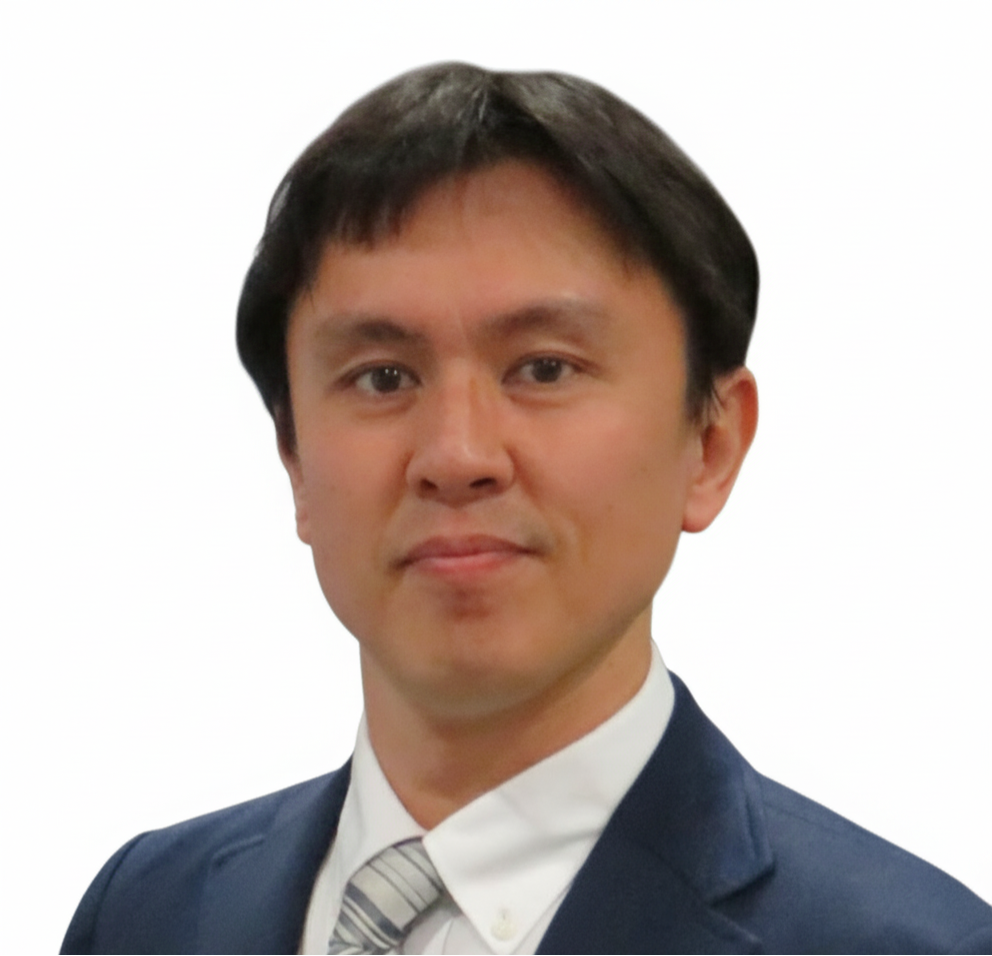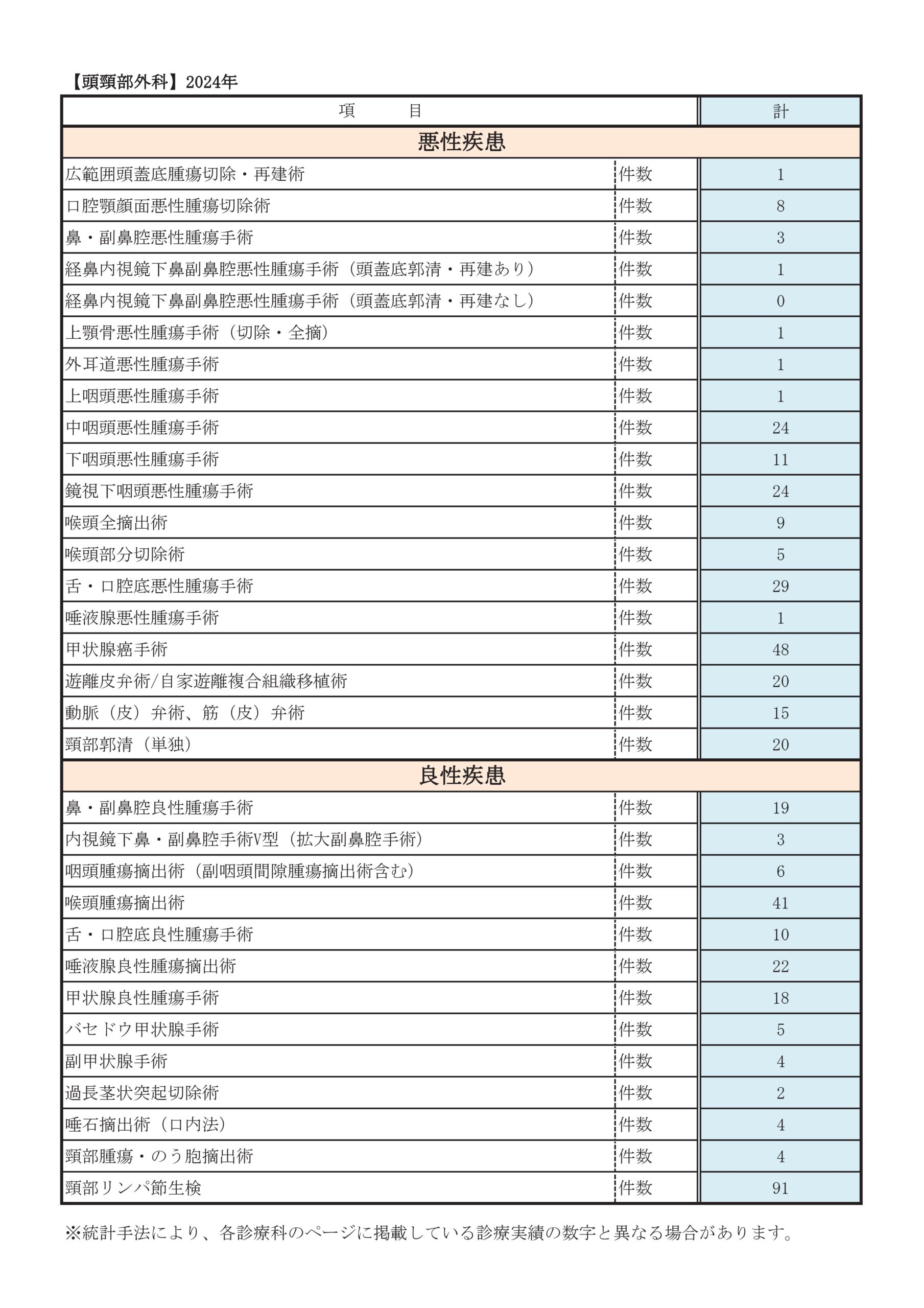頭頸部腫瘍とは、頭頸部領域、つまり顔面から頸部に発生する腫瘍のことを言います。腫瘍は悪性と良性とにわかれますが、悪性疾患は「がん」と呼ばれます。よって、頭頸部領域に発生する悪性腫瘍は「頭頸部がん」と総称されます。頭頸部がん※には、口腔がん(舌がん、歯肉がんなど)、咽頭がん(上咽頭がん、中咽頭がん、下咽頭がん)、喉頭がん、鼻副鼻腔がん、唾液腺がん(耳下腺がん、顎下腺がんなど)、甲状腺がんなどがあり、当科ではこれら頭頸部がん治療とともに良性の頭頸部腫瘍も数多く扱っています。
(※頭頸部がんの詳細な説明は日本頭頸部癌学会のホームページに記載されていますので是非ご参照ください。http://www.jshnc.umin.ne.jp/general/index.html)
また、頭頸部領域だけでなく、頭蓋底・縦隔・眼窩に発生した腫瘍に対しても、脳神経外科・呼吸器外科・眼科と連携を取りながら治療を行っています。頭頸部領域は咀嚼、嚥下、発声、呼吸など、生命維持に不可欠であり、ここに発生するがんはこれらの機能を大きく損います。特に顔面に発生した腫瘍の治療には、審美面の考慮も必須です。治療においては、がんの治癒だけでなく、生活の質と外見の維持も重要です。治療方針は、当院放射線治療医・腫瘍内科医との定期的なカンファレンスにより決定し、がんの進行度と患者さんの全身状態、社会的背景を総合的に評価し、それぞれの患者さんに適した治療法を頭頸部外科の専門外来で提示しています。 当院の頭頸部外科における頭頸部がん治療の特徴は以下の通りです。
① 頭頸部がん診療の経験が豊富な専門医のもとで、早期がんから進行がんまで、部位・進行度を問わず、患者さんに最適な治療(手術、放射線治療、化学療法)を提供可能であること
② 低侵襲内視鏡手術を推進していること
・早期咽頭がんに対して消化器内科医が口から内視鏡を挿入し、頭頸部外科医がモニターを使用してがんを切除する経口的鏡視下手術を行っています。
・早期の鼻副鼻腔がんや嗅神経芽細胞腫などの前頭蓋底悪性腫瘍に対して、開頭や顔面切開を避ける経鼻内視鏡下鼻副鼻腔悪性腫瘍手術(鼻から細い内視鏡を入れて腫瘍を摘出する手術)を行っています。また、翼口蓋窩や側頭下窩などの顔面深部に発生する腫瘍に対しては、経鼻内視鏡手術単独あるいは小さな顔面切開との併用手術により、顔面や頭部の傷を作らないあるいは最小限の傷での手術を行っています。 これらの治療は、頭頸部がん指導医と鼻科手術指導医の双方の資格を有する医師が中心となることで、根治性を失わない低侵襲な内視鏡手術となっています。
③ 治療困難症例に対応していること
・腫瘍が大きく周囲に進展している進行がんに対しては、放射線治療では根治が得られないことが多いため、がんを周囲の臓器とともに広く切除する拡大手術と、切除で失われた部位を組み立てる再建手術が必要となります。当科では、形成外科医、歯科口腔外科医、消化器外科医等の関連診療科と連携し、再建手術を要する局所進行がんに対する手術を積極的に行っています。特に口腔外科・形成外科の診療技術が充実しており、術後の機能再建を考慮した治療計画が可能です。
・放射線療法後に再発した患者さんの命を救うための“救済手術”はリスクが高く難度も高いですが、患者さんの状況に応じ行っています。上咽頭がん放射線治療後再発に対する経鼻内視鏡下での救済手術など、他施設では治療が困難な症例に対しても積極的に手術加療を行っています。
・頭蓋内浸潤を伴う頭蓋底腫瘍に対しては脳神経外科と合同でチーム医療を行っています。頭頸部外科は経顔面または経鼻内視鏡アプローチにより頭蓋外の腫瘍切除を担当します。
・高齢者や基礎疾患を持つ患者さんに対しても、関連科と連携し、治療リスクを評価した上で標準治療またはそれに準じた治療を行っており、必要に応じて緩和医療も提供しています。
・標準治療終了後の切除不能局所進行・局所再発頭頸部がんに対し、光免疫療法を行っています。
④ 放射線治療医、腫瘍内科医、血管内治療医の診療技術が充実しており、放射線治療、抗がん剤治療から、超選択的動注化学放射線治療(RADPLAT)まで、手術以外の治療の選択肢も豊富であること。
・近隣の医療機関と協力して重粒子線治療、陽子線治療、ホウ素中性子捕獲療法(BNCT)などの治療も可能です。
⑤ 甲状腺疾患の治療に関しては、内分泌内科医・核医学専門放射線治療医・腫瘍内科医が充足しており、手術、放射性ヨード治療から分子標的薬治療まで連携をとって総合的な治療が可能であること。また甲状腺手術に関連する音声障害に関して、耳鼻咽喉科が母体である技術を生かして、音声改善手術も可能であること。
また、日本専門医機構認定の耳鼻咽喉科専門研修プログラム基幹施設、日本気管食道科学会認定専門医研修施設、日本頭頸部外科学会指定研修施設、内分泌・甲状腺外科専門医認定施設、日本鼻科学会手術指導医制度認可施設を標榜し、耳鼻咽喉科専門医、頭頸部がん専門医、内分泌外科専門医、気管食道科専門医の育成にも力を入れています。臨床研究も盛んで、例年平均して3件程度の国外学会発表、10件程度の国内学会発表、3本程度の英文雑誌、5本程度の和文雑誌に論文を上梓し、海外でも通用する頭頸部外科治療施設を目指しています(学術業績については耳鼻咽喉科>お知らせの の項をご参照ください)
頭頸部外科では主に頭頸部に発生した腫瘍の診断、検査および手術や放射線治療を中心とした治療を行っています
〈頭頸部外科の専門外来〉
頭頸部外科の専門外来は、耳鼻咽喉科あるいは口腔外科の初診を経てから受診していただいています。耳鼻咽喉科の外来で週に3回、口腔外科の外来では週に1回、頭頸部外科の専門外来を開いており、おもに頭頸部がん患者さんの診察を行っています。
頭頸部がんの治療にあたっては、根治性(どれだけがんが治るか)だけではなく、 治療後のQOL(quality of life;生活の質)をいかに維持できるかの配慮が重要となってきます。頭頸部がんの治療では、早期がんに対しては手術あるいは放射線療法が、進行がんに対しては手術・放射線療法・化学療法を組み合わせた集学的治療が行われ、各患者さんに応じた最適な治療を行っています。耳鼻咽喉科の外来では、頭頸部がん専門医及び指導医を有する医師が2名、毎週診察にあたっています。
治療方針は、耳鼻咽喉科頭頸部外科医で構成される毎週のカンファレンスと、耳鼻咽喉科頭頸部外科医、放射線治療医、腫瘍内科医から構成される隔週の放射線カンファレンスにおいて検討され、がんの進行度(病期、ステージ)と患者さんの全身状態、社会的背景を総合的に評価し、それぞれの患者さんに適した治療法を頭頸部外科の専門外来で提示しています。そのため、手術を積極的に勧めたり、放射線治療を積極的に勧めたりといった、個人や診療科の独断に偏った治療方針を提供することがありません。治療方針決定後は、専門医によるチーム医療を提供します。
〈手術〉
鼻・副鼻腔腫瘍、耳下腺・顎下腺などの唾液腺腫瘍、舌がん・歯肉がんなどの口腔がん、中・下咽頭がん、喉頭がん、頸部食道がん、甲状腺・副甲状腺腫瘍に対する手術を実施しています。
頭頸部領域には、聴覚・嗅覚・味覚といった感覚器や、摂食嚥下・発声・呼吸などの生きていくうえで重要な機能にかかわる臓器が含まれます。さらに顔・首といった審美面(見た目)に関わる領域であるため、手術にあたっては根治性とともに術後の審美面への配慮と術後の機能温存を心掛けています。
早期の咽頭がんに対しては、消化器内科医と合同で頸部を切らない低侵襲手術の経口的鏡視下手術を、早期の鼻副鼻腔がんや脳への浸潤を認めない嗅神経芽細胞腫などの前頭蓋底悪性腫瘍に対しては、顔面を切らない低侵襲手術の経鼻内視鏡下手術を積極的に行っています。
一方進行がんに対しては、がんを完全に取り除くために広く組織を切除する必要があり、術後の嚥下障害や発声障害等の後遺症が避けられない場合があります。声帯を手術で失い発声が不可能になってしまった場合は、気管食道シャントを作ることで代用音声を獲得することが場合により可能です。また、手術後の組織欠損が大きい場合には、形成外科チームと連携して、遊離皮弁による再建手術を実施しています。
頭頸部領域は周囲に大血管や脳、神経、眼球など重要な臓器が隣接する、解剖学的に非常に複雑な領域です。当院には頭頸部がん専門医・指導医だけでなく、耳科手術指導医・鼻科手術指導医が在籍しており、聴器や鼻副鼻腔に発生したがんに対しては、耳鼻咽喉科頭頸部外科内でチームを組み、それぞれの解剖のスペシャリストが分担で手術を担当するようなチーム手術も行っています。頭蓋底や上縦隔など、脳神経外科や呼吸器外科など頭頸部外科以外の専門領域にまたぐ腫瘍に対しては、脳神経外科・呼吸器外科と連携し合同手術を施行しています。
〈放射線治療〉
主に早期の咽喉頭がんに対して、体の外から放射線を照射する放射線治療を行っています。声を失わず、手術をせずに根治を目指すことが可能です。進行がんの場合も、患者さんの希望や状態に応じて放射線治療を行うことがあり、その適応は、耳鼻咽喉科頭頸部外科医、放射線治療医、腫瘍内科医から構成される放射線カンファレンスにおいて検討されます。また、手術後の再発を予防するために、化学放射線療法(抗がん剤を併用した放射線治療)を行う場合もあります。治療には強度変調放射線治療(IMRT)を使用し、照射線量は50Gy~70Gy、照射期間は5週間~7週間程度です。
診療実績
診療科別統計
主な疾患・治療法
口腔癌治療では、手術を中心に、形成外科と合同で機能再建手術を手掛けています。また、上下顎などの切除後の補綴やインプラントは口腔外科班のスタッフが手術前から関与し、質の高い医療を提供しています。
鼻副鼻腔癌の治療は外科的切除が基本ですが、局所進行性の非扁平上皮癌の場合、陽子線をはじめとする粒子線治療が適応となることがあります。早期例では、低侵襲手術を目指し、経鼻内視鏡手術を積極的に導入しています。一方、進行例では顔面切開などの外切開手術が必要になる場合がありますが、内視鏡を併用することで切開範囲の縮小や鼻腔内の切除精度向上を図っています。
嗅神経芽細胞腫に代表される前頭蓋底悪性腫瘍に対する内視鏡下経鼻手術は、外切開手術と比較して同等以上の治療成績が得られるうえ、審美的に優れ、低侵襲で術後の合併症が少ないため、入院期間を短縮できるという利点があります。当科では、脳実質への浸潤がない嗅神経芽細胞腫に対し、内視鏡単独手術が可能です。さらに、当科の特徴として、鼻科手術指導医と頭頸部癌指導医の資格を有する医師が手術を担当するため、安全で確実な手術を提供しています。一方、脳浸潤を伴う局所進行性の嗅神経芽細胞腫に対しては、脳神経外科と連携し、開頭手術と経鼻手術を同時に行う体制を整えています。
総説はこちら内視鏡下経鼻頭蓋底手術について
当科部長の菊地正弘による同手術に関する総説が、J-STAGEで公開されています。ぜひご覧ください。
J-STAGEはこちら進行頭頸部癌の患者さんに対する治療方針決定の際には、PET/CTなどの機能画像を駆使し、手術を選択するか、機能温存を図って化学放射線療法を選択するか、case by caseに最良の治療法を検討しています。
放射線治療医と定期的に放射線治療カンファレンスを実施しています。適応があれば強度変調放射線治療(IMRT)などを使用して、患者さん個々に応じた最適な放射線治療を提供しています
中下咽頭癌の表在癌に対しては、消化器内科の内視鏡専門医と合同で経口腔的治療に積極的に取り組み、より低侵襲な臓器温存治療を図っています。

学術実績
頭頸部外科10件
- 菊地正弘 : 前頭蓋底手術 どっちを選ぶ? Endoscopic vs Endoscopic and Exoscopic:内視鏡下経鼻前頭蓋底手術. 耳鼻咽喉科・頭頸部外科 96; 4: 346-350, 2024 (DOI:10.11477/mf.1411203631)
- 菊地正弘: 翼口蓋窩手術のための局所解剖. 耳鼻咽喉科・頭頸部外科 96; 5: 294-301, 2024 (DOI:10.11477/mf.1411203688)
- 菊地正弘: PET検査. プラクティス耳鼻咽喉科の臨床1 耳鼻咽喉科 日常検査リファレンスブック, 大森孝一, 中川尚志 編, 第1版, 中山書店, 東京, 40-52, 2024
- 吉村雅衣, 松永麻美, 菊地正弘, 北田有史, 大森孝一: Endoscopic modified medial maxillectomy(EMMM)にて全摘した含歯性嚢胞例. 耳鼻臨床 117; 9: 813-820, 2024 (DOI:10.5631/jibirin.117.813)
- Mitani K, Tanji M, Kitada Y, Kikuchi M, Sugimoto A, Fujimoto M, Arakawa Y: Acute peritumoral brainstem hemorrhage of a clival chondrosarcoma successfully treated via endoscopic endonasal surgery: illustrative case. J Neurosurg Case Lessons 8; 12: CASE2460, 2024 (DOI:10.3171/CASE2460)
- Kikuchi M, Nakamura E, Oyagi S, Shinohara S, Yamamoto N: Enhancing Precision and Esthetics: Endoscopy-Assisted Total Maxillectomy for Locally Invasive Maxillary Ameloblastoma Using Contralateral Transmaxillary Approach Without Subciliary Incision. Cureus 16; 11: e73192 (DOI:10.7759/cureus.73192)
- 松永麻美, 菊地正弘: 京都大学のCST これまでの軌跡と未来 ESSから鼻副鼻腔頭蓋底手術まで. 新薬と臨牀 73; 2: 1389-1406, 2024
- 菊地正弘: 嗅神経芽細胞腫の長期的生命予後と再発形式 : 単施設における13年の経験(ANL Ssecondary Publication). 日耳鼻 127; 12: 1290-1292, 2024 (DOI : 10.3950/jibiinkotokeibu.127.12_1290)
- Sano N, Tanji M, Inoue Y, Nagahori T, Kitada Y, Matsunaga M, Kikuchi M, Arakawa Y: Detection of suprasellar subarachnoid hemorrhage using intraoperative magnetic resonance imaging during endoscopic transsphenoidal resection of pituitary neuroendocrine tumors. Surg Neurol Int 16: 57, 2025 (DOI: 10.25259/SNI_921_2024)
- Tanji M, Sano N, Hashimoto J, Kikuchi M, Matsunaga M, Kitada Y, Yamamoba M, Takeushi Y, Makino Y, Yamamoto Hattori E, Terada Y, Mineharu Y, Arakawa Y: Multiport combined endoscopic endonasal and transorbital approach to orbital schwannoma. Surgical Neurology International 16 (98):1-8, 2025. (DOI:10.25259/SNI_246_2024)
頭頸部外科22件
学会発表
- 菊地正弘: 頭頸部外科医の立場からみた中咽頭癌治療前後の画像診断の役割. 第83回日本医学放射線学会総会, 横浜市, 2024.4.11
- 菊地正弘, 中村優仁,他: Contralateral transmaxillary approachを併用したCombined surgeryを行った局所進行上顎エナメル上皮腫例. 第48回日本頭頸部癌学会, 浜松市, 2024.6.21
- 中村優仁, 菊地正弘,他: 内視鏡補助下に除去し得た眼窩内異物(マイラゲル強膜スポンジ)の 1 例. 第86回耳鼻咽喉科臨床学会総会・学術講演会, 福井市, 2024.6.28
- 宮田大道, 菊地正弘,他: 第2鰓裂由来の不完全外瘻型側頸瘻の一例. 第202回日本耳鼻咽喉科頭頸部外科学会 兵庫県地方部会学術講演会, 神戸市, 2024.7.7
- 丹治正大, 菊地正弘,他: 経鼻内視鏡手術におけるICA損傷経験の事後検証. 第31回一般社団法人日本神経内視鏡学会, 東京都, 2024.11.7
- 徳田和樹、光吉隆真,小久保結未,芦田良,今葷倍敏行,山元智子、菊地正弘、小倉香奈子、小久保雅樹: 光線過敏症患者において放射線壊死を生じた一例. 日本放射線腫瘍学会第37回学術大会, 横浜市, 2024.11.21
- 奥田奈子, 菊地正弘,他: 経鼻内視鏡下transpterygoid approachによる病変摘出と術後機能保存の工夫. 第203回日本耳鼻咽喉科頭頸部外科学会 兵庫県地方部会学術講演会, 西宮市, 2024.12.5
- 大八木誠児, 河合良隆, 大森孝一: 成体ラット気道上皮における平面内極性の局所制御機構について. 第203回日本耳鼻咽喉科頭頸部外科学会 兵庫県地方部会学術講演会, 西宮市, 2024.12.5
- 大八木誠児, 菊地正弘,他: 原発不明癌頸部リンパ節転移として頸部郭清術,拡大扁摘術を行い、術後病理診断で側頸嚢胞と診断された一例. 第34回日本頭頸部外科学会総会ならびに学術講演会, 東京都, 2025.1.30
- 菊地正弘, 大八木誠児,他: 上顎骨骨切り時の経鼻内視鏡併用の利点. 第34回日本頭頸部外科学会総会ならびに学術講演会, 東京都, 2025.1.31
- 奥田奈子, 菊地正弘,他: 経鼻内視鏡下transpterygoid approachによる病変摘出と術後機能温存の工夫. 第34回日本頭頸部外科学会総会ならびに学術講演会, 東京都, 2025.1.31
- 菊地正弘: 頭頸部外科医の立場からみた中咽頭癌治療前後の画像診断の役割. 第44回日本画像医学術集会, 東京都, 2025.2.14
ランチョンセミナー、企業共催など
- 菊地正弘: 骨を制する者が経鼻手術を制する. 第125回日本耳鼻咽喉科頭頸部外科学会総会・学術講演会, 大阪市, 2024.5.16
- 菊地正弘: 鼻副鼻腔・頭蓋底腫瘍に対する内視鏡下経鼻手術~基本手技から頭蓋底手術まで~. 第8回あけぼの杉耳鼻咽喉科研究会, 名古屋市, 2024.9.7
- 菊地正弘: 心地よいセットアップ下での鼻副鼻腔腫瘍に対する内視鏡下経鼻手術. 第63回日本鼻科学会総会・学術講演会, 東京都, 2024.9.27
- 菊地正弘: 好酸球性副鼻腔炎の診断と治療. OneAirway Collaboration Conference, WEB開催, 2024.11.29
- 菊地正弘: アレルギー性真菌症としてのECRS・重症喘息の一例を振り返る~呼吸器・耳鼻科連携の強化を目指して~. OneAirway Collaboration Conference, WEB開催, 2024.11.29
- 菊地正弘: 当科における内視鏡下経鼻手術(良性疾患から悪性腫瘍まで). 第20回神戸市立医療センター中央市民病院耳鼻咽喉科・頭頸部外科地域合同オープンカンファレンス,神戸, , 神戸市, 2024.12.5
- 中村優仁: 内視鏡補助下に除去し得た眼窩内異物(マイラゲル強膜スポンジ)の一例. 第46回京都耳鼻咽喉科研究会, 京都市, 2024.12.7
- 菊地正弘: 骨解剖を意識した経鼻内視鏡手術. 第13回獨協医大 鼻副鼻腔・頭蓋底内視鏡手術研修会, 栃木県, 2024.12.22
市民講座
- 菊地正弘: 頭頸部がんのA to Z-頭頸部がんのリスクと予防、治療の新展開-. 頭頸部外科月間 市民公開講座, 神戸市, 2024.7.26
臨床研究
臨床研究に関するお知らせ
| 研究科題名 | 当院責任者 | 説明文 |
|---|---|---|
| 鼻副鼻腔・頭蓋底腫瘍に対する治療成績の検討 | 菊地正弘 | |
| 甲状腺乳頭癌患者T1-3N1bM0における放射性ヨード治療の効果に関する多施設共同研究 | 菊地正弘 | |
| 日本における頭頸部悪性腫瘍登録事業の実施 | 菊地正弘 | |
| 頭頸部の希少腫瘍における疫学、経過、治療成績、および予後の検証 | 菊地正弘 | |
| 咽頭・喉頭・気管狭窄に関する全国疫学調査 | 篠原尚吾 | |
| 一般社団法人National Clinical Database(NCD)における手術・治療情報データベース事業 | 菊地正弘 |
研究期間が終了した臨床研究
| 研究科題名 | 当院責任者 | 説明文 |
|---|---|---|
💡新着情報あり お知らせ
頭頸部外科専門研修についてはこちら
当病院は日本頭頸部外科学会頭頸部がん認定施設、日本内分泌外科学会認定施設、日本気管食道科学会認定専門研修施設、日本鼻科学会手術指導医制度認可施設ですので、頭頸部がん、甲状腺腫瘍、咽喉頭腫瘍、頸部食道がん、鼻副鼻腔腫瘍、頭蓋底腫瘍などの症例が豊富です。当院での頭頸部外科専門研修をご希望の方は、「神戸中央市民耳鼻咽喉科・頭頸部外科専門研修プログラム」をご一読ください。耳鼻咽喉科・頭頸部外科専門研修の基幹病院として神戸市立医療センター研修プログラムを提供しています。また「採用情報」のサイトから「専攻医プログラム・募集要項」も参照してください。
当科で力を入れている経鼻内視鏡下/経鼻内視鏡補助下頭蓋底手術について、中央市民病院ニュース(No.89;2024年8月28日発行)で紹介されました。
中央市民病院ニュース No.892024年7月28日、当科部長の菊地正弘が神戸市中央区文化センターで「頭頸部がんのA to Z ~頭頸部がんのリスクと予防、治療の新展開~」をテーマに講演を行いました。この講演では、頭頸部がんの発症リスクや予防方法、治療の最新動向について解説し、啓発活動の一環として多くの方に情報をお届けしました。
2024年10月1日、厚生労働省近畿厚生局より内視鏡下鼻・副鼻腔手術V型(拡大副鼻腔手術)及び経鼻内視鏡下鼻副鼻腔悪性腫瘍手術(頭蓋底郭清、再建を伴うもの)の施設基準の届出が受理されました。
2024年1月1日、一般社団法人日本鼻科学会 認定手術指導医制度鼻科手術認可施設に認定されました。
2025年5月より、当院耳鼻咽喉科・頭頸部外科では、中咽頭がんなどに対する新しい外科的治療法として「経口ロボット手術(TORS:Transoral Robotic Surgery)」を導入いたしました。
この手術は、口の中から手術支援ロボット「ダヴィンチ」を用いて腫瘍を切除する方法で、外部に大きな切開を加えることなく、より精密で低侵襲な治療が可能です。従来の開放手術や放射線治療と比べて、嚥下や発声といった機能を温存しやすく、手術後の生活の質(QOL)向上が期待されます。
対象となる方には、手術の目的・方法・メリット・リスクを十分に説明し、文書での同意を得た上で、安全に配慮して実施いたします。ご不明な点や詳しい内容については、主治医までお気軽にご相談ください。



